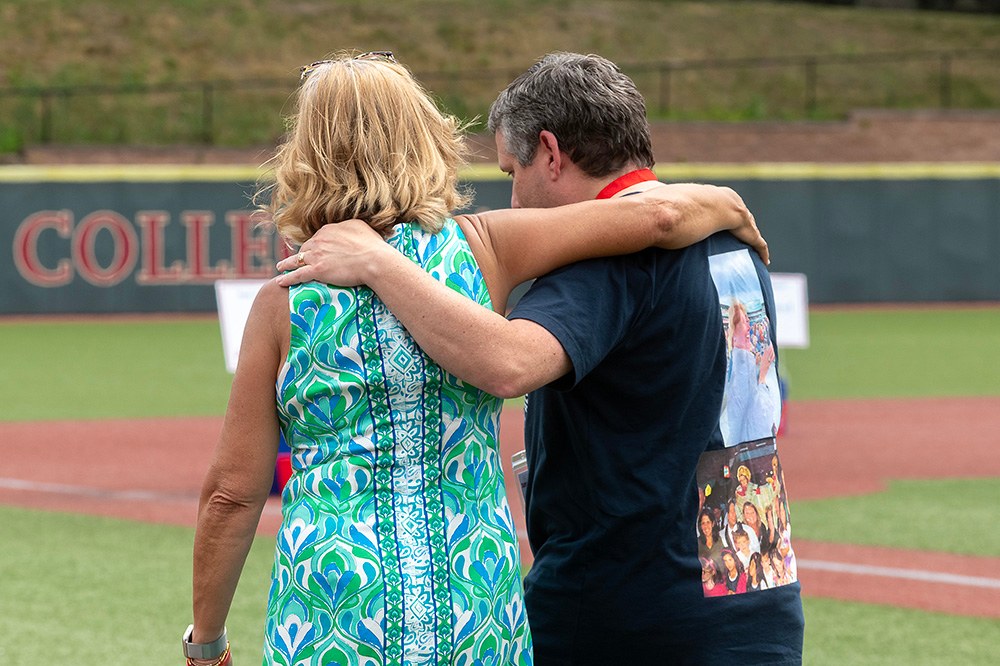
Celebrating 10 years of the Ice Bucket Challenge
In the summer of 2014, pretty much everybody was filming themselves dumping buckets of ice on their heads, including Sal DiDomenico ’97, a State Senator and graduate of BC’s Woods College of Advancing Studies. He and millions of others took part in the Ice Bucket Challenge, as it became known, raising $115 million for ALS research while bringing unprecedented attention to the rare and fatal disease.
At the time, DiDomenico had no personal connection to ALS, but when his mother was diagnosed in 2022, he felt the impact of the fundraiser he had participated in years before.
“My mom got to take medication and get treatments that didn’t exist prior to the Ice Bucket Challenge,” he said recently. “Every dollar that’s going into research, every new advancement, extends the life of a person with ALS for themselves and for their family.”
On a recent Friday afternoon, DiDomenico joined two dozen business and community leaders at the ALS Association’s CEO Soak, a fundraising event held on the baseball field at Boston College to celebrate the Ice Bucket Challenge’s 10-year anniversary. Participants raised more than $60,000 for ALS research in the weeks leading up to the event, and arrived at the Harrington Athletics Village dressed in suits and ties despite temperatures nearing 90 degrees. As an announcer read off their names, they gamely took their places around the diamond, then doused themselves in freezing cold water as a small crowd cheered them on.
Hanging on the wall behind them in centerfield was the retired number three, worn by former BC Baseball captain Pete Frates ’07 before he became one of the leading advocates for ALS research. Frates, who passed away from the disease in 2019, was one of the first people to participate in the Ice Bucket Challenge, helping to propel it into a global phenomenon. In 2022, Boston College dedicated the Pete Frates Center, a 31,000-square-foot indoor baseball and softball facility, in his honor.
“This is the epicenter of the Ice Bucket Challenge,” said ALS Association Chief Community Engagement Officer Jen Hjelle from a podium behind home plate. “I’m getting goosebumps, actually, thinking about it.”
In the 10 years since #icebucketchallenge took over the internet, the ALS Association has spent 154 million dollars, funding more than 500 research projects across 19 countries, Hjelle said. Because of this investment, 12 new genes related to ALS have been discovered, and the FDA has approved two new treatments, including the first targeting a genetic form of ALS. The Association has also doubled the amount of clinics it supports across the country, helping more patients access multidisciplinary care.
None of it would be possible without the leadership of people like Frates, who dedicated the final years of his life to pushing for a cure he would never receive. His memory is a source of constant inspiration for members of the current BC Baseball team, including infielder Vince Cimini ’23, M.B.A. ’25, who did his first Ice Bucket Challenge at the age of 13 (at a Residence Inn in Flemington, New Jersey) and was among the BC players who participated in the CEO Soak event.
“I’ve done at least one a year every year I’ve been here,” he said. “Any time we have a chance to spread the word about ALS awareness—whether it’s an ice bucket challenge or lunch with someone who’s associated with the cause—it’s an immediate ‘yes.’”
Ice Bucket Impact
In the 10 years since #icebucketchallenge took over the internet, the ALS Association has spent 154 million dollars, funding more than 500 research projects across 19 countries. Because of this investment, 12 new genes related to ALS have been discovered, and the FDA has approved two new treatments.
Nancy Frates ’80 received the ALS Association’s Hometown Hero award at the event, and delivered a heartfelt keynote address celebrating the power of individuals to show up and make a difference. Pete would have been proud, she said, of the people standing behind her on the field, buckets filled and ready to go.
“People always ask me, ‘10 years ago, how did it happen’?” she said. “I always have a simple answer: it was a life lived full of love, compassion, empathy, and leadership. When Pete was playing, he led by telling his teammates, ‘you have to be the best you can be so that it’s better for the guys coming up behind you,’ and he did that in the world of ALS too.”

Nancy Frates '80 and State Senator Sal DiDomenico '97 share a moment during the event.
